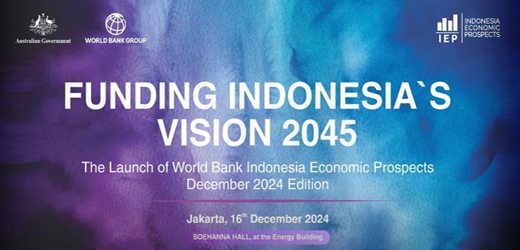
 ศักยภาพของอุตสาหกรรมสร้างสรรค์ของไทยในอินโดนีเซีย
ข้อมูลเกี่ยวกับศักยภาพของอุตสาหกรรมสร้างสรรค์ของไทยในอินโดนีเซีย...
ศักยภาพของอุตสาหกรรมสร้างสรรค์ของไทยในอินโดนีเซีย
ข้อมูลเกี่ยวกับศักยภาพของอุตสาหกรรมสร้างสรรค์ของไทยในอินโดนีเซีย...
![]() ศักยภาพของอุตสาหกรรมสร้างสรรค์ของไทยในอินโดนีเซีย
ศักยภาพของอุตสาหกรรมสร้างสรรค์ของไทยในอินโดนีเซีย
![]() การขึ้นภาษี VAT ของอินโดนีเซีย
การขึ้นภาษี VAT ของอินโดนีเซีย
![]() Summary of the Launch of World Bank’s Indonesia Economic Prospects (IEP) December 2024
Summary of the Launch of World Bank’s Indonesia Economic Prospects (IEP) December 2024
![]() สรุปข้อมูลกรณีการห้ามขาย iPhone 16 ในอินโดนีเซีย
สรุปข้อมูลกรณีการห้ามขาย iPhone 16 ในอินโดนีเซีย
![]() พัฒนาการสำคัญด้านเศรษฐกิจ ในระหว่างวาระการดำรงตำแหน่งของประธานาธิบดี Joko Widodo (ค.ศ. 2014-2024)
พัฒนาการสำคัญด้านเศรษฐกิจ ในระหว่างวาระการดำรงตำแหน่งของประธานาธิบดี Joko Widodo (ค.ศ. 2014-2024)
![]() แนวนโยบายเศรษฐกิจของประธานาธิบดี Prabowo Subianto (ค.ศ. 2024-2029)
แนวนโยบายเศรษฐกิจของประธานาธิบดี Prabowo Subianto (ค.ศ. 2024-2029)
![]() กองทุน Daya Anagata Nusantara (Danantara) ของอินโดนีเซีย
กองทุน Daya Anagata Nusantara (Danantara) ของอินโดนีเซีย
![]() ข้อมูลโดยสังเขปเกี่ยวกับอุตสาหกรรมการท่องเที่ยวอินโดนีเซีย
ข้อมูลโดยสังเขปเกี่ยวกับอุตสาหกรรมการท่องเที่ยวอินโดนีเซีย
![]() การเก็บภาษีนักท่องเที่ยวต่างชาติที่เดินทางเข้าบาหลี (International Tourists Levy)
การเก็บภาษีนักท่องเที่ยวต่างชาติที่เดินทางเข้าบาหลี (International Tourists Levy)
![]() สรุปรายละเอียดเกี่ยวกับพัฒนาการของกฎหมาย Omnibus Law on Job Creation
สรุปรายละเอียดเกี่ยวกับพัฒนาการของกฎหมาย Omnibus Law on Job Creation


























